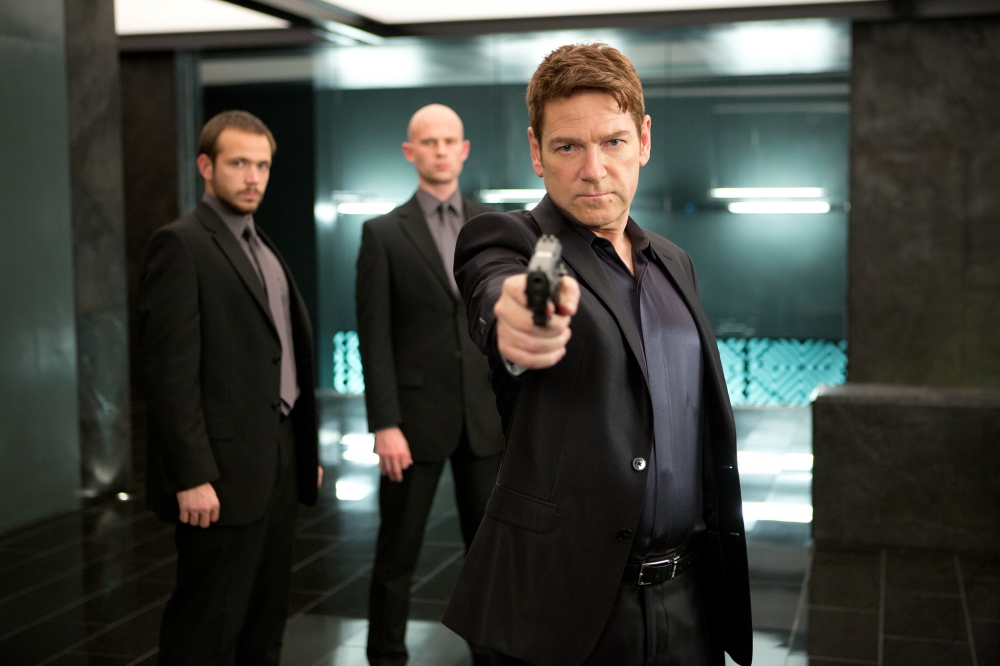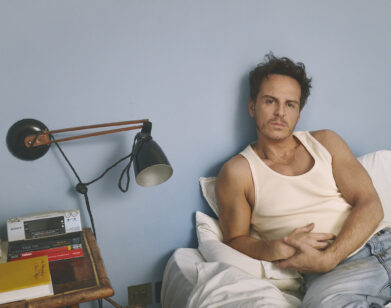Kenneth Branagh’s Character Studies

ABOVE: KENNETH BRANAGH AS VIKTOR CHEVERIN IN JACK RYAN: SHADOW RECRUIT.
Kenneth Branagh’s résumé could easily belong to two different people. First, there is Branagh the classically trained and Oscar-nominated gatekeeper of Shakespeare for the masses, the director and star of Henry V (1989), Much Ado About Nothing (1993), Hamlet (1996), and Love’s Labour’s Lost (2000). More recently, there is Branagh, director of action blockbusters. 2014 is no different. This week, Jack Ryan: Shadow Recruit, Branagh’s take on Tom Clancy’s well-documented action hero, will open nationwide. In May, the British actor will reprise his role as Macbeth in Shakespeare’s Scottish play at The Armory in New York.
Branagh, however, does not distinguish between genres. Whether he’s playing a supervillain, as in Jack Ryan, or a Shakespearean, the emphasis is on the details. “I always ask people to do this exercise in rehearsal where, in the middle of a scene, everybody freezes and you ask everybody exactly what they’re thinking at that moment,” he explains over the phone. “You ask them what they had for breakfast, where they bought the clothes they’re wearing—as many specifics as possible to do with a real life. The audience will intuit that kind of detail, and feel that additional level of reality.” For Branagh, no one audience is more intelligent than another: “It felt very important to do it [with Jack Ryan],” he comments, “but I also try to do it with Shakespeare. I made an opera film where that was one of the things we did.”
In previous decades, Jack Ryan has been played by Alec Baldwin, Harrison Ford, and Ben Affleck. In 2014, the economist and reluctant spy comes in the form of Chris Pine, with Keira Knightley as his fiancée and Kevin Costner as his CIA handler. Branagh plays Ryan’s antagonist, a comical Russian oligarch-turned-terrorist with a weighty chip on his shoulder named Viktor Cherevin. Dancer and actor Mikhail Baryshnikov makes a welcome cameo as the head of Russia’s FSB and Cheverin’s superior.
EMMA BROWN: The film begins on September 11, 2001, when Jack Ryan was studying for his doctorate at LSE. Do you remember where you were on that day?
BRANAGH: I do. In fact, the images of Jack Ryan in London on that day are from my own memory of being on the streets of London—the sort of waves of people who came through the streets and the sense of complete bewilderment. I was actually rehearsing a play and I remember getting in a black cab to Waterloo Station to get a train home. I stopped to go to an ATM and when I got back in the car, I remember the taxi driver saying, “Have you heard the news?” And I hadn’t, but I’d been aware that there was an incredible amount of activity on the street, everybody on their cell phones. The soundtrack on the streets of London was people checking with loved ones and trying to find out information and find out if everybody was well. It was as if the entire population came out onto the street. And I remembered, when we were shooting this in Jack Ryan, very clearly those feelings and sensations of that day.
BROWN: When you saw everyone out on the streets, what did you think had happened?
BRANAGH: It was very hard to understand. You did feel possibly as if we were under attack or that some sort of catastrophe had occurred. In Jack Ryan, the piece of audio that you hear over the pictures is from an actual television newscaster in England, called Kirsty Young. She was speaking in that real clip to her real husband, who was in New York. And what was poignant on the day and with that piece is that, they were both concerned for themselves as partners, but she was also doing a professional job. He, because he’s in New York, was talking to her as a journalist and a reporter. What happened was so extraordinary that the beginnings of it, for what seemed like hours, was still a process of simply not believing that what was going on was really happening or possible. And the lack of communication made people all the more bewildered.
BROWN: I really liked the Mikhail Baryshnikov cameo. How did that happen?
BRANAGH: He has always been, to me, a completely fascinating figure. I hadn’t seen him perform live until two years ago in Los Angeles. He was appearing in a play called In Paris, in a theater down at Santa Monica, and I went to see him. He was in such impressive physical shape and he, in this sort of abstract play about a Russian émigré in Paris at the turn of the 20th century, was so magnetic and compelling. Although I guess he’s in his 60s now and not dancing much, he did a dance move in it where he leapt up in the air and spun around and landed as if he was a feather. As he did so, the audience, which was about 1,000 strong, gasped as one because of this feeling of watching a master at work doing what he was renowned for doing. I carried away the sense of him as an incredibly charismatic individual. I saw him afterwards and had a chance to have a little chat. Then maybe eight, nine months later, this came up. I thought he comes on and somehow, [even] if people aren’t aware of who he is, he carries this sort of sense of otherness. He’s just an amazing physical performer. If you’re going to have somebody who’s walking in the woods with dangerous information—private information—there would be a lot said by just the very fact of just Baryshnikov walking. [laughs] It was very enjoyable to work with him. He liked rehearsing a great deal; for a small piece of the movie we rehearsed an enormous amount. Because he’s a dancer, he likes to repeat things and get them right. That face is also tremendously telling and communicative. He’s Latvian, but he speaks Russian and was brought up in Moscow. It felt like he gave us an instant and early level of authenticity that was invaluable. He’s very modest about his acting capabilities, so he was concerned about getting the translation of the Russian correct. We had an excellent translator, but it’s subject to interpretation. He was one of the most princely, civilized, and gentlemanly collaborators I’ve ever come across and left our set with our entire crew completely and utterly charmed by him. He has an innate humility, which is very affecting.
BROWN: I was curious about your character’s tattoos. They’re never explained, but they are clearly important.
BRANAGH: They were part of his involvement with various gangs—our back-story for Viktor Cherevin, who we imagined had lived through the Soviet-era, joined the Russian army, been to Chechnya, fought, been injured. We imagined a business career where he had been tremendously aggressive in pursuit of wealth and that this led him into crime, which led him into prison, which would have led him to allegiances with gangs, which would have produced tattoos that in themselves were almost marks of honor and part of those who meet him knowing that he is the formidable person that he is. They were based on real tattoos to do with gangs; evidence of death and murderous capability are enshrined in these tattoos. It’s part of Viktor subtly—or not so subtly, perhaps—letting the world know who he was and how dangerous he was.
BROWN: Do you generally come up with such an extensive back-story for your characters?
BRANAGH: The attitude towards films like this is sometimes a lazy one, in as much as—and I can see this myself—in that with action thrillers, the disposition is to assume immediately that they are generic, that they’re derivative, that there are too many of them. You go to the airport and look at the bookstand and you feel the titles are similar, the covers are similar, and you wonder how they can be different. So from my point of view, the necessity here is you want to feel that everything a character says is really telling and truthful. There was nothing being generalized, it was all investigated and everything had a past, an intention. Even if the back story is five pages and the line you say is six words, somehow it feels as though the audience will get whether there’s something underneath.
JACK RYAN: SHADOW RECRUIT OPENS TOMORROW, JANUARY 17.






